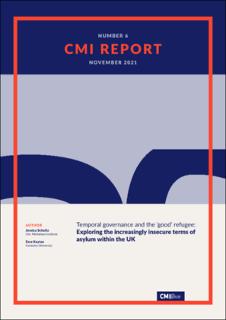Temporal governance, protection elsewhere and the ‘good’ refugee: a study of the shrinking scope of asylum within the UK
Original version
Bergen: Chr. Michelsen Institute (CMI Report 2021:06) 32 p.Abstract
In recent years European countries have introduced increasingly temporary terms of asylum for people with a recognized need for protection. This study traces the temporary turn in the UK, where asylum policies have traditionally focused more on preventing new arrivals than on limiting the rights of people with refugee status. Refugees in the UK experience insecurity of status stemming from the broader ‘hostile environment’ aimed at ‘bogus’ asylum seekers and irregularised migrants. Infractions such as illegal entry and unauthorized labour can sabotage efforts to secure permanent residence years down the line. Refugees are also subject to specific policies, including safe return reviews, after a probationary period of residence is over. Application of the internal relocation principle and broad inadmissibility criteria mean that refugees may be ‘returned’ to unfamiliar areas of their home country or third countries to which they have no meaningful ties. Finally, this study highlighted barriers to citizenship, including the ‘good character’ requirement, that affect refugees in particular ways. The New Plan for Immigration, along with the measures to implement it proposed in the Nationality and Borders Bill, would punish refugees who arrive seeking asylum by imposing a longer path to settlement and denying them public support. These policies collapse the temporal and spatial dimensions of border control, subjecting ‘inadmissible’ refugees resident in the UK to prolonged temporary status and violating their rights under international refugee law.
Publisher
Chr. Michelsen InstituteSeries
CMI Report 2021:06CMI Report 2021:06
